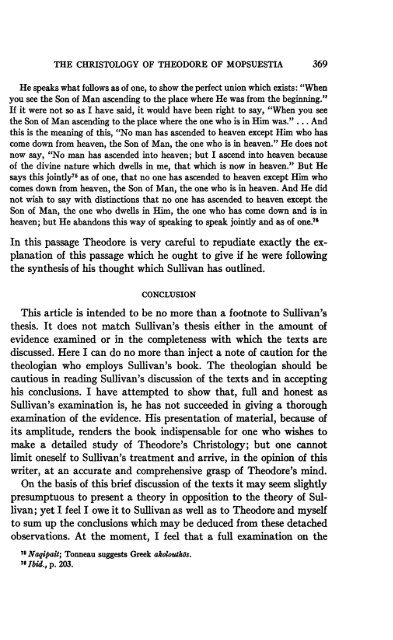ANNOTATIONS ON THE CHRISTOLOGY OF THEODORE OF ...
ANNOTATIONS ON THE CHRISTOLOGY OF THEODORE OF ...
ANNOTATIONS ON THE CHRISTOLOGY OF THEODORE OF ...
You also want an ePaper? Increase the reach of your titles
YUMPU automatically turns print PDFs into web optimized ePapers that Google loves.
<strong>THE</strong> <strong>CHRISTOLOGY</strong> <strong>OF</strong> <strong>THE</strong>ODORE <strong>OF</strong> MOPSUESTIA 369<br />
He speaks what follows as of one, to show the perfect union which exists: "When<br />
you see the Son of Man ascending to the place where He was from the beginning."<br />
If it were not so as I have said, it would have been right to say, "When you see<br />
the Son of Man ascending to the place where the one who is in Him was." ... And<br />
this is the meaning of this, "No man has ascended to heaven except Him who has<br />
come down from heaven, the Son of Man, the one who is in heaven." He does not<br />
now say, "No man has ascended into heaven; but I ascend into heaven because<br />
of the divine nature which dwells in me, that which is now in heaven." But He<br />
says this jointly 76 as of one, that no one has ascended to heaven except Him who<br />
comes down from heaven, the Son of Man, the one who is in heaven. And He did<br />
not wish to say with distinctions that no one has ascended to heaven except the<br />
Son of Man, the one who dwells in Him, the one who has come down and is in<br />
heaven; but He abandons this way of speaking to speak jointly and as of one. 76<br />
In this passage Theodore is very careful to repudiate exactly the explanation<br />
of this passage which he ought to give if he were following<br />
the synthesis of his thought which Sullivan has outlined.<br />
C<strong>ON</strong>CLUSI<strong>ON</strong><br />
This article is intended to be no more than a footnote to Sullivan's<br />
thesis. It does not match Sullivan's thesis either in the amount of<br />
evidence examined or in the completeness with which the texts are<br />
discussed. Here I can do no more than inject a note of caution for the<br />
theologian who employs Sullivan's book. The theologian should be<br />
cautious in reading Sullivan's discussion of the texts and in accepting<br />
his conclusions. I have attempted to show that, full and honest as<br />
Sullivan's examination is, he has not succeeded in giving a thorough<br />
examination of the evidence. His presentation of material, because of<br />
its amplitude, renders the book indispensable for one who wishes to<br />
make a detailed study of Theodore's Christology; but one cannot<br />
limit oneself to Sullivan's treatment and arrive, in the opinion of this<br />
writer, at an accurate and comprehensive grasp of Theodore's mind.<br />
On the basis of this brief discussion of the texts it may seem slightly<br />
presumptuous to present a theory in opposition to the theory of Sullivan;<br />
yet I feel I owe it to Sullivan as well as to Theodore and myself<br />
to sum up the conclusions which may be deduced from these detached<br />
observations. At the moment, I feel that a full examination on the<br />
76 Naqipait; Tonneau suggests Greek akolouthds.<br />
"Ibid., p. 203.
















